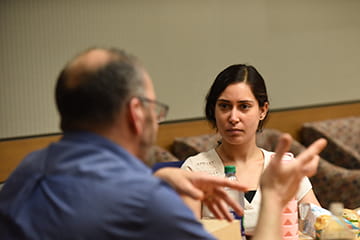The Master of Science (MS) degree program in the Department of Microbiology and Immunology prepares research scientists for productive careers at a highly competitive level in the ever-changing health care market place. The department offers didactic coursework sufficient for rapid mastery of concepts central to the discipline while emphasizing active student involvement in the laboratory as quickly as possible. Students are engaged in ongoing accrual of knowledge and accomplishments in the Department of Microbiology and Immunology through attendance at the weekly departmental seminar, participation in the weekly departmental research in progress meeting, participation in journal clubs and research meetings and attendance and presentations at local and national meetings. The program provides varied forums to enhance student communication and teaching skills and expects training to be completed in two to three years, producing independent, creative investigators.
Apply for a Master’s Degree
Prospective Microbiology and Immunology MS students must apply online through the IUPUI Graduate Office by May 1 (domestic applicants) or by February 1 (international applicants) to matriculate in August of the same year.
 Mentors and Advisors
Mentors and Advisors
Upon admission to the program, a graduate advisor develops with the student a course schedule for the fall term. Each new student is also assigned a senior student to act as a mentor for the first year. In the first semester of study, the MS student performs a four-week research rotation in the laboratory of a departmental faculty member that previously agreed to serve as the student’s rotation mentor.
In consultation with the mentor, the student selects an advisory committee consisting of the mentor (serves as chair) and at least two additional faculty from the Department of Microbiology and Immunology. The student’s advisory committee includes the major advisor and at least two additional faculty, at least one of which must be from within the microbiology and immunology program. The third committee member may be from within or outside the department. At least one committee member must have a primary appointment in the Department of Microbiology and Immunology. Each student should meet with his/ her advisory committee at least two times per year.
The advisory committee for combined degree candidates (MD or DDS-MS) must include an appropriate representative from the clinical faculty. It is the responsibility of the advisory committee to counsel the student both in coursework and in research, to determine academic deficiencies and to suggest corrective measures for such deficiencies, including appropriate coursework. The advisory committee also recommends for approval by the graduate school the transfer of academic credits earned at another institution. At each committee meeting, the advisory committee, mentor and trainee should review and approve the student’s educational plan for that year, including the trainees’ laboratory work and attendance at required seminars. Satisfactory completion of a research thesis and oral thesis defense is determined by the advisory committee, ordinarily at the end of two years of studies.
Degree Requirements
Microbiology and Immunology MS students must complete at least 10 non-thesis credits and 16 thesis credits during the program and a minimum total of 30 credits. Students must maintain a B average (3.0). Only three credits of C (2.0) can be counted toward the required credits of didactic coursework. Each student joins a research laboratory and performs original research for a MS thesis. The student must successfully defend the thesis to their advisory committee.
Grades
-
Grades
Grades for research credits (J810) are assigned by the student’s committee. An overall average of at least a B (3.0 GPA) is required. Only three credits of C (2.0 GPA) can be counted toward the required credits of didactic coursework.
-
Transfer CreditMS students may transfer up to eight credits of graduate-level coursework from other institutions. No course may be transferred from another institution unless the grade is B or higher and unless the course was completed within five years prior to the awarding of the MS degree.
-
Financial ResponsibilityMS students are not financially supported by the department, must pay for own courses and fees.

